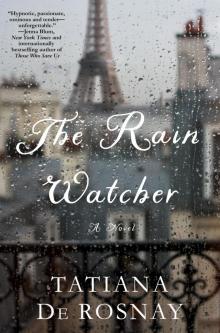- Home
- Tatiana de Rosnay
The House I Loved Page 5
The House I Loved Read online
Page 5
Rue Childebert, September 28th, 1834
My very dear Rose,
How empty the house is without you, Armand and the little girl! My, my, it seems so big all of a sudden, the very walls echo my loneliness. Two long weeks until you all come back from your trip to Burgundy. How on earth am I going to manage? I cannot bear sitting in the living room alone. My knitting, my newspaper, my Bible, everything falls from my hand. I realize now, in these grim moments, how much you mean to me, my sweet Rose. Yes, you are the daughter I never had. And I sense that I am closer to you than your mother is, bless her heart. How lucky we are to have found each other through my son, your husband. You are the light of our lives, Rose. Before you came to live here, a certain gloominess lurked within these walls. It was you who brought the laughter, the cheerfulness within.
I believe that you have no idea of all this. You are such an unselfish, pure person, Rose. Yet beneath that sweetness there is a very great strength. I sometimes wonder what you will be like when you are my age. I cannot for the life of me envisage you as an old lady, as you are youth embodied. The graceful swing of your step, the gold richness of your hair, your smile and those eyes. Oh, yes, my Rose, those eyes. They will never fade. When you are old and gray as I am now, your eyes will blaze on, so blue.
Why have you turned up so late in my existence? I know I will not live very many more years, the doctor has warned me about my heart, and nothing much can be done about my state. I go for my little walks without you, and they are much less pleasurable. (Madame Collévillé accompanies me and she walks terribly slowly and smells of something sour that is displeasing…)
Yesterday we witnessed a fight on the rue de l’Echaudé. It was marvelously dramatic. Some fellow had had too much, no doubt, of the Green Fairy and was bothering a finely dressed lady. Another man told him to stop it, shoved him away from the lady and then the drunkard lunged forward, there was a dreadful crack, a shriek, blood, and the poor man who had tried to save the lady got his nose broken. At that point yet another man joined into the battle, and soon, before you could draw breath, the entire street was full of wrestling, sweating men. The lady stood there, clutching her parasol and looking perfectly lovely and silly. (Oh, you would have adored the way she was dressed, I recall it especially just for you: one of those hourglass-shaped dresses, a blue-spotted delight, and a rather dashing bonnet with an ostrich feather that trembled as much as she did.)
Come home soon, dearest Rose, and bring my loved ones home safely as well.
Your doting mother-in-law,
Odette Bazelet
I DID NOT SLEEP well last night. The nightmare tormented me once more. The intruder, making his way up the stairs slowly, taking his time, fully aware that I am upstairs, asleep. The creak of the stairs, how well I hear it and how it fills me with dread. I know that bringing back the past is never a peaceful process. It awakens turmoil and regret. Nevertheless, the past is all I have left. I am alone now, my love. Violette and my pompous son-in-law believe I am on my way to them. My grandchildren are expecting their grandmère. Germaine is wondering where Madame is. My furniture arrived last week, my valises and trunks were delivered a few days ago. Germaine has probably unpacked all my clothes, my room in their large home overlooking the Loire is no doubt ready. Flowers by the bed. Fresh sheets. When they will become worried, they will surely write. I do not feel much concern.
Nearly fifteen years ago, when the Prefect started his massive destructions, we learned that my brother Émile’s lodgings were to be torn down for the opening of the new boulevard de Sébastopol. Émile had not seemed concerned, he was to be paid a good sum in compensation, and with his wife Edith and their children, they had decided to move to the west of the city, where her family dwelled. Émile was not like you, not attached to houses. For you, houses are like people, are they not, they have a soul, a heart, they live and breathe. Houses remember. Émile is now an elderly gentleman with gout and no hair, and I believe you would not recognize him. I find he resembles my mother, thankfully he does not possess her vanity and her emptiness. Merely the longish nose and dimpled chin that I did not inherit.
After our mother passed away, just after the coup d’état, and after Émile’s house had been razed, we did not see much of him, did we? We had not even been to visit their new place in Vaucresson. But you were fond of my brother, of “Mimile,” as we used to call him affectionately. He became the little brother you never had.
One inauspicious afternoon you and I had decided to walk over to the renovations to look at the progress. Émile had already moved into his new abode with his family. You ambled slowly then, Armand, your illness was taking its toll, you only had two more years to live, which of course we knew nothing about. You could still stroll quietly at my side, holding on to my arm.
We were unprepared for what awaited us. Our peaceful faubourg Saint-Germain had nothing to do with what we saw. This was no longer Paris. This was war.
We simply did not know where we were anymore. We had walked up the rue Saint-André-des-Arts, expecting to end up on the rue Poupée, as usual, but the latter had vanished.
In its place gaped a gigantic pit hemmed in by buildings in ruins. We looked around us in a daze. Where on earth was Émile’s old house? Émile’s neighborhood? The restaurant on the rue des Deux Portes where we celebrated his wedding? The renowned bakery on the rue Percée? And that pleasant boutique where I had purchased those fashionable embroidered gloves for Maman Odette? There was nothing left. We inched along, stupefied.
We discovered that the rue de la Harpe had been savagely truncated. The rue Serpente as well. All around us, crumbling edifices seemed to quiver perilously, bearing shreds of wallpaper, charred and blackened passages of fireplaces, doors absurdly still hanging on hinges, intact flights of stairs spiraling into nothingness. It was a hallucinatory sight and bringing it back now still makes me nauseous.
We gingerly picked our way to a more sheltered spot, looking down with anguish to the heart of the pit. Hordes of workers carrying pickaxes, shovels, hammers, swarmed like a gigantic army through mounds of rubble and billowing clouds that stung our eyes. Thick streams of horses pulled planks on carts. Here and there bonfires burned furiously with unimaginable rage, as men loaded more timber and more debris into the voracious flames.
The noise was abominable. You know, I can still hear the harsh crackle of the blaze, the shouts and the yells from the workers, the unbearable hammering of pickaxes digging into the stone, the deafening thuds that made the earth under our feet shudder. Our clothes were soon mottled by a thick layer of soot, our shoes coated with lime, and the hem of my dress was sodden. Our faces were gray with grit, our mouths and tongues parched. We both coughed and puffed, tears streaming down our faces. I could feel your arm shaking next to mine. I noticed that we were not the only spectators. Other people had gathered to watch the destructions. Their grimy faces were awed, their eyes red and watery, smarting from the ashes and the dust.
We had read about this in the newspaper—we knew, like all Parisians, that parts of our city were to be renovated—but never had we imagined this inferno. And yet, I mused, transfixed by what I was seeing, this was where people had lived and breathed, this had been their home. Over there, on that disintegrating wall, was the vestige of someone’s fireplace, with the faint trace of a painting that used to hang there. A family had gathered in front of that mantelpiece in the winter. And that cheerful wallpaper used to line another person’s bedroom, somebody had slept and dreamed here, and now what was left? A wasteland.
Living in Paris under the reign of our Emperor and our Prefect was like living in a besieged city invaded daily by dirt, rubble, ashes and mud. Our clothes, shoes and hats were always dusty. Our eyes always stung, our hair was perpetually thick with a fine gray powder. How ironic, I thought as I patted your arm, that right next to this massive field of ruins other Parisians placidly got on with their lives. This was only the beginning, and we were not aware of what lay ahead. We
had been putting up with the embellishments for three or four years. Little did we know then that the Prefect would not relent, that he would inflict the inhuman pace of expropriations and demolitions on our city for fifteen more years.
We decided hastily to take our leave. You were deathly pale and your breath was short. How could we ever get back to the rue Childebert? We had lost our bearings. We were in unknown territory. Wherever we turned, panicked, we were met with pandemonium, blizzards of ashes, thunderlike explosions, avalanches of bricks. Mud and soggy waste churned under our feet as we desperately tried to find our way out. “Get away, for God’s sake!” boomed a furious voice as an entire façade collapsed only a short distance away with an earsplitting crash and the piercing smattering of broken glass.
We took hours reaching home. That evening you did not speak. When we sat down to dinner, you ate nothing and your hands trembled. I began to understand that bringing you to see the destructions was a terrible mistake.
I tried to comfort you, I repeated the very words you had uttered when the Prefect was appointed:
“They will never touch the church, the houses around it, we are safe, our house is safe.”
You would not listen to me. You left the table and went to the window, clasping and unclasping your hands. I watched you slowly scratch the side of your face over and over again, to such an extent that I longed to pry your nails from running down your cheeks.
“Come and have some warm soup, dearest,” I begged, “it will do you good after that long walk.”
Your eyes were glassy and wide, and I knew you kept seeing the façades crumbling, the swarms of workers hacking away at the buildings and the flames blazing in the pit.
I got up to try to coerce you back to the table, but you pushed me away, quite savagely. I did not know what to do. So I sat there, helpless, immobile, till the food became cold and it was cleared away in silence. Getting you to come to bed that night was also an ordeal. Again you shoved me away, wordlessly, with a new vehemence that shocked me.
It was in those moments, I believe, that the first signs of your illness became most apparent. I had not noticed these signs before, but now they were obvious. Your mind was undergoing a sort of confusion. You were agitated, distracted, you seemed lost.
It was from then on that you refused to leave the house, even for a short walk to the gardens. You remained in the sitting room, your back upright, facing the door. You would sit like that for hours, heedless of me, of Germaine, of anyone speaking to you. You were the man of the house, you muttered, yes, that was exactly what you were, the man of the house. No one was going to touch your house. No one.
After your death, the destructions went on, led by the merciless Prefect and his bloodthirsty team, but in other parts of the city. I was too intent on learning how to survive without you.
But two years ago, well before the letter arrived, an incident took place. And then I knew. Yes, I knew.
It happened as I was leaving Madame Godfin’s shop with my chamomile tisane. I noticed a gentleman standing on the street corner in front of the water fountain. He was painstakingly setting up a camera, and a deferential assistant was hovering nearby. It was early, I recall, and the street was not yet busy. The man was short and sturdy, with graying hair and a mustache. I had not seen very many cameras before, only at the photographer’s on the rue Taranne who had taken our portraits.
I slowed down as I approached him and watched him at work. It seemed a most complicated affair. At first I could not comprehend what he was photographing, as there was no one in sight apart from me. His apparatus was facing the rue des Ciseaux. As he fiddled about, I discreetly asked the young assistant what their business was.
“Monsieur Marville is the Prefect’s professional photographer,” announced the young man, his chest fairly bloating with pride.
“I see…” I answered. “And who is it that Monsieur Marville will be photographing at present?”
The young fellow looked down at me as if I had said something incredibly stupid. He had an oafish face and bad teeth for his age.
“Well, madame, he does not photograph people. He photographs streets.” Another swell of his torso. “According to the Prefect’s orders, and with my help, Monsieur Marville is photographing the streets of Paris that are to be destroyed for the renovations.”
Vaucresson, April 26th, 1857
My dear sister,
We are now installed in our new abode, in Vaucresson. I believe it would take you a mere couple of hours to get to us, should you and Armand care to drop by, which I very much hope you will. But I understand that your eventual visit will have to do with your husband’s strength. The last time I saw him, he had already much declined. I am writing this to tell you, dear sister, how unfair I find your situation. For the past years, you and Armand have struck me as being a profoundly happy couple. Such happiness is rare, I find. You recall, no doubt, our miserable childhood, the threadbare affection our mother (bless her soul) bestowed upon us. I believe I do not share with my wife anything quite as deep and meaningful as what you share with your husband. Yes, life has been cruel with you, and I still cannot bring myself to write my nephew’s name. But despite the blows that fate has dealt you, Armand and you have always seemed to rise above those blows and I admire that tremendously.
I think you would like this new house, Rose. It stands on a hill, and has a long, green garden which the children enjoy. It is large, and sunny, and most cheerful. It is far from the noise and dust of the city, far from the Prefect’s works. I sometimes think Armand would be happier in a place like this than in the dark rue Childebert. He would revel in the sweet perfume of grass, the nearby woods, the song of the birds, but then, of course, I remember how both of you love your neighborhood. Odd, isn’t it? Whilst I grew up, with you, in place Gozlin, I already cherished the fact that one day I was going to leave. Even if Edith and I lived a long while on the doomed rue Poupée, I fully knew that I would not end my days in the city. When we received the letter from the Préfecture informing us that our house was to be destroyed, I realized that this was the change I had always been waiting for.
I know you believe the rue Childbert is safe, Rose, because it is so near the church at Saint-Germain. I know how much Armand’s family home means to him. But don’t you believe that attaching such importance to a house is unwise? In his state of mind, losing his abode would be an utter disaster. Do you not think that it would be more judicious to move away from the city? I could help you find a charming place near us, here in Vaucresson. I think you would appreciate the calm and harmony of this little village. You are not yet fifty, there is still time to move on and start again, and you know that Edith and I would help. Violette is happily married, living in Tours, raising her children, she does not need her parents anymore. There is nothing to hold you back in Paris.
I beseech you, Rose, do think this over. Think of your husband’s health and of your well-being.
Your affectionate brother,
Émile
IT IS A SWEET relief being certain that no living soul will ever set eyes on what I have been scribbling away at, down here. I feel liberated, and my confessions, although a burden, appear slightly alleviated. Are you with me, Armand? Can you hear me? I like to think you are right here, by my side. I do wish I possessed a camera, like Monsieur Marville, and that I could have photographed every single room of our house in order to immortalize it.
I would have started with our bedroom. The heart of our house. The other day, when the movers came to pack up our furniture to send it to Violette’s place, I spent a long moment in our bedroom. If walls could speak, would they not have related so many tales? They have witnessed death and life. I stood where the bed was, facing the window, and I said to myself, This is where you were born, this is where you died. This is where your father passed away, and probably his father as well. This is where I brought our children into the world.
I would always remember the canary-yellow wallpaper, the
bordeaux velvet drapes, the arrowheaded curtain rods. The marble fireplace. The oval mirror with its gilded frame. The graceful bonheur du jour, its drawers full of letters, stamps and pens. The small table inlaid with rosewood where you put your spectacles, your gloves, and where I stacked the books purchased from Monsieur Zamaretti’s shop. The wide mahogany bed with brass fittings, and your gray felt slippers by the left side, where you used to sleep. Yes, I will always remember how the sun shone here, even on a winter morning, running a triumphant golden finger along the walls, lighting the yellow to an incandescent gold.
When I think of our room, the acute pain of childbirth comes back to me. They say women forget with the passing of time, but no, I shall never consign to oblivion the day Violette was born. My mother had not spoken to me about the matters of life before I got married. But then, what did my mother speak to me about? Search as I might, I cannot recall an interesting conversation, a memorable moment. Your own mother had murmured a few words before my confinement for our first child. She had said to be brave. The words sent a chill down my spine. The obstetrician was a placid gentleman who never spoke much and the midwife who came to visit me was always in a hurry, as there was another lady in the neighborhood who needed her assistance. I had started the pregnancy well enough, with hardly any queasiness or other disorders. I was twenty-two years old, and healthy.
The scorching heat of July. It had not rained for weeks. My labor had already commenced and the ache in my back gradually grew more and more pronounced. I suddenly wondered if what was lying ahead for me would not be utterly dreadful. I dared not complain for the moment. I lay on the bed, Maman Odette patting my hand. The midwife arrived late. She had been caught up in a mob and turned up breathless, her bonnet tied crookedly. We had no idea of what was happening outside. She informed you and Maman Odette in a low whisper that people were starting to manifest, that it was getting ugly. She thought I could not hear, but I did.

 A Secret Kept
A Secret Kept Sarah's Key
Sarah's Key A Paris Affair
A Paris Affair The Other Story
The Other Story The House I Loved
The House I Loved The Rain Watcher
The Rain Watcher